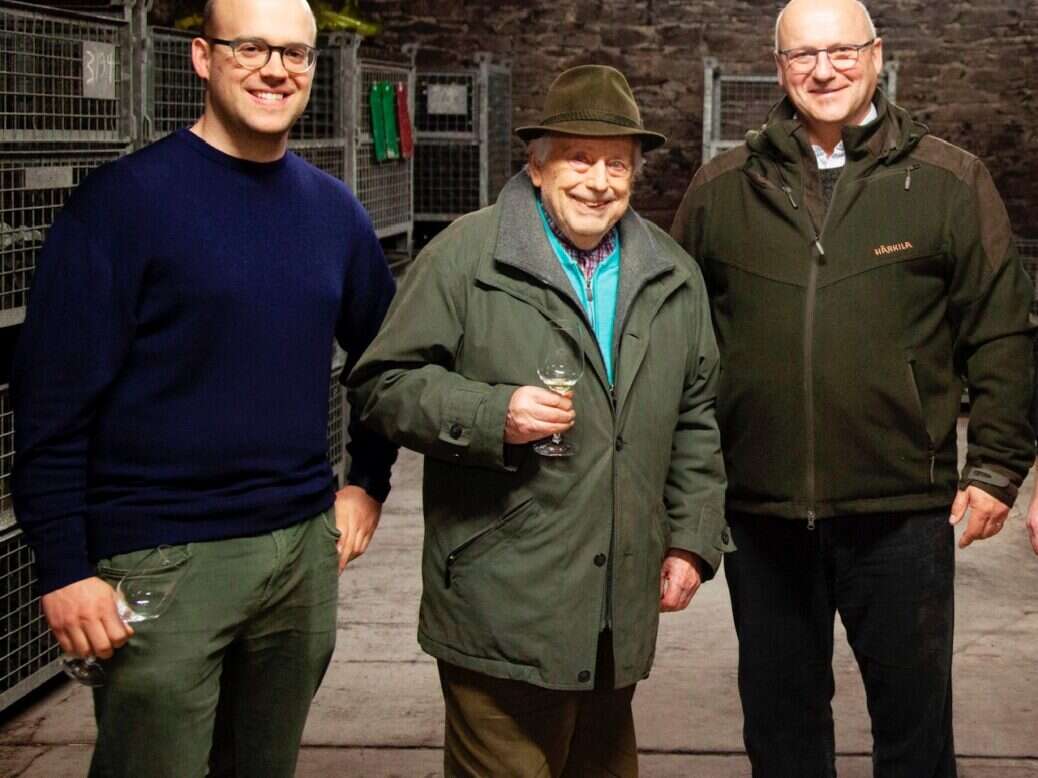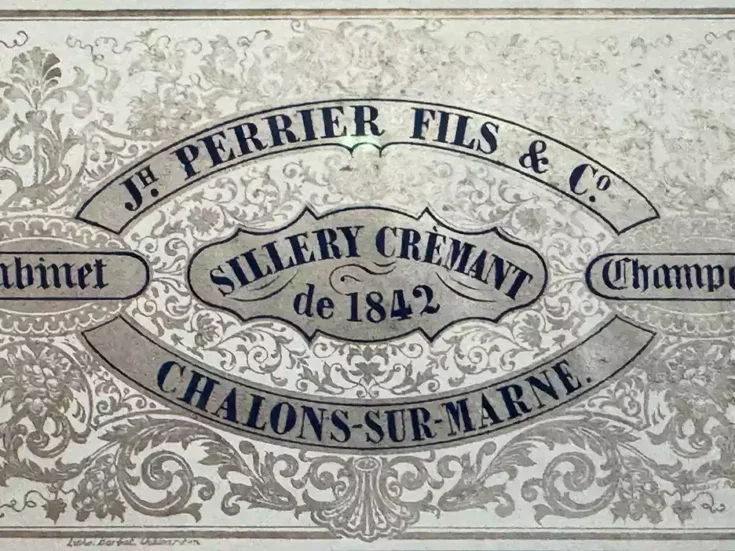
The most poignant thing about a Merkelbach wine is the innocence with which it arrives. It has no agenda, it doesn’t care to impress you; it has no ego, and it really has no affect you can discern. Even when a given wine is full of energy, it shows up placid and unguarded. The wines are napped in silence and calm, though individual wines may be precise and articulate. It makes me think of footsteps in newly fallen snow, where no feet have stepped before you. They are unique among all the wines I know, and this signifies much more than my opinion of any particular one of them.
These will very likely be the last ‘21s I taste from Mosel producers whom I represented. My hesitancy about the vintage is established by now, and I wonder how these will be. Last night I opened a bottle of 2005 Würzgarten Spätlese; it looked all of two–to-three years old (in a vintage with a lot of premox) and tasted like a dream of Riesling Eden.
To refresh your memories, the estate is being operated by Selbach now—vineyards and cellar both—and Johannes is careful to maintain the Merkelbach style, which entails doing things quite differently than they’re done in his own estate. That choice is pragmatic and sensible, but not only; It is also neighborly, even affectionate, and most certainly respectful. In any case it stirs me, just as Rolf and Alfred Merkelbach’s wines have always stirred me.
Each of the wines in this flight of eight underwent an evolution in the glass, and I often felt as though I had arrived in a different country from the one I set off from. Rather than alter my notes though, I’m leaving them as they were, because these transits are salient; any discussion of the wines is denuded without them.
And so we begin.
2021 Merkelbach Riesling Trocken
The color is a shade darker than that 2005 was last night! The fragrance is what it should be, with an Ürzig angularity and a Kinheim apple-skin chew. (Can a fragrance have “chew?” Evidently so.) The palate could be called “sleek” if one approved of it, “thin” if one wasn’t sure, and “scrawny” if there isn’t enough fruit for our hypothetical “one.” There is marked length and linger for such a light wine, but the matter of fruit isn’t settled to my own satisfaction.
It’s a thirst-quencher, but so are a lot of other white wines that have plenty of fruit, and this wine for its several positive attributes is just too ascetic. As you know, dry German Rieslings have improved dramatically in the last 15-20 years, but that doesn’t mean any old wine can succeed in this style.
That said, many ‘21s are in an in-between phase wherein they have shed their baby-fruit (very early) and haven’t replaced it with the tertiary flavors that usually follow seamlessly. I can’t be sure that this wine is stingy; it might just be mute at the moment. We’ll see how it fares over the days.
It is rather different the next day. For one thing, its residual sugar (below the legal limit of 9g/l obviously) is noticeable, and the wine is much less lean. Today I’d stop at “tart” and push “steely” away. It maintains the angular texture of a chaptalized wine (which it clearly is) but it’s far less forbidding now. One won’t write verses in its honor, but neither will one dismiss it out of hand. It was wise to have given it a day to get over the grumps.
2021 Merkelbach Kinheimer Rosenberg Riesling Spätlese Trocken
Again more yellow than I expected. It smells pretty. The wine was excellent in the 2020 vintage. And it a leap forward from the previous wine here. The texture is more elegant and integrated; the interplay of slate and fruit is visible and pleasing, and while the wine is hardly chummy it offers much vim and distinctiveness and many things to enjoy.
The gestalt is snappy, but within the outlines is a certain…not “richness” exactly, but a certain substance, and a certain rounding of the edges, so that this very dry wine displays a furtive kind of grace.
Rosenberg can show a musk-melon element sometimes, along with a smokiness as if you were burning herbs. This was dramatically present on day two, and utterly invisible upon opening. It shows an intricate minerality from the Jancis glass. The deliberate finish is as much quince as apple. It has a basmati sort of starchiness, and it resolves into a lovely dry Riesling that some would call cerebral—and nothing the matter with that. The finish takes the mid palate and stretches it into the next county …
2021 Merkelbach Kinheimer Rosenberg Riesling Kabinett +
It smells like it should, this vineyard in this vintage with this ripeness. It’s on the dry side, as Merkelbach’s wines are (we’ll leave the outlier vintage 2018 out of this discussion …) and modest in the most positive way. What it is, is a charming little wine. It isn’t slight, but neither is it completed; it would need more middle and more visible ripeness.
As it is it slips down easily and forgettably. It isn’t overly acidic and it finishes balanced and dry after a somewhat misaligned beginning—common to many ‘21s that needed more sweetness to mitigate their acids but which would then have been too sweet. But this unassuming little wine knits together admirably over the palate, and it’s one of the ‘21s that can fool you; it grows in the glass and shows a swell of almost ferrous urgestein character—a kind of dark-slate—that really overtakes the external notes of the wine and leaves you in quite a different place from where you started.
The more I sip it the more it impresses me, and the more I have to surmount my own expectations. I assume this site will give lovely, even euphoric wines, but I don’t expect to see the brooding, expressionistic minerality I’m seeing here. My first impression was wrong, which is why any reviewer is a fool to “score” a wine based on a first-impression. I’m no stranger to foolishness, but that’s one I escaped from.
If I tasted it blind I’d think Saar more than Mosel. The tip off would be grapefruit and quince. I’d guess Wawerner Herrenberg, and then all my friends would laugh at me. I’d have to make all new friends, again.
This wine was fruitier on day two, less insistently ferrous and “dark.” It shows wintergreen today, for reasons I struggle to explain.
2021 Merkelbach Ürziger Würzgarten Riesling Kabinett +
This is amazingly good and really entirely perfect. Each piece is where it should be, every element of balance and interplay is precise and easeful, and it is pure Würzgarten. If you were leading a seminar on Mosel Grands Crus you could—should!—use this as the very paradigm for this site.
It is also a great triumph for the ’21 Mosel vintage, a wine with none of the issues that plague the crop. Acidity, while brisk, is balanced. Sweetness is as good as invisible. Finish is maybe a little bracing, but within bounds. And the overall effect is seamless and complex.
It’s passionately introverted, and will shrink into itself if there are lots of clamorous wines around it. Could you see it accurately in a “big tasting?” I can’t fathom how. But put a little gray around it, and watch as its own gaudy colors shine through.
Yet as much as this is one of those “no need to say much” wines (as it explains itself so well), I have an image-tone. If you cook meat sous-vide you probably do a last-minute sear to caramelize the surface, and if you think of that—the melting purity of the interior with the snappy crunch of the exterior—you’ll understand something of the physical tactile life of a wine like this one.
2022 Merkelbach Ürziger Würzgarten Riesling Kabinett
Alcohol is a percent higher (9% versus 8%) than the ’21. The aromas are more exotic, somewhere between yeasty and cilantro, even beery.
This follows on to the palate, which is of an entirely different structure, shape and contour than the ’21. Acids are more discreet, mid-palate is softer, and while the wine is articulate, it isn’t precise. There’s also more apple and less sassafrass then in the ’21. The wines share a perfect and seamless balance of sweetness with….well, everything else.
It’s also more peppery. It has the exotic florals of Tasmanian pepper. It’s a scoosh less good than the ’21 but it’s also the easier drink. It rewards your attention but doesn’t compel it. You have to wait 5-10 minutes for it to shed those “curious” opening notes, but when it does it offers another sort of portrait of Würzgarten, softer but no less classic.
But is it “classic?” It starts off encased in strangeness, and while it does eventually emerge, it’s as if a vintner set about to make a “natural” wine and abandoned it half way through. Because that Pet-Natty thing is more stubborn than I like. If you spent all day tasting ‘22s you’d probably grow numb to it after awhile, but I’m in transit from those crisply bracing ‘21s, so it stands out.
In contrast to its brethren, this wine was better yesterday, suggesting that it might be best to drink these to the bottom when you broach them.
2021 Merkelbach Kinheimer Rosenberg Riesling Spätlese
This shows the color I thought I’d find, which is to say, no color.
It smells great, pure Rosenberg, pure Merkelbach. The palate, with its 7.5% alc, arrives less sweet than that would suggest, but does the opposite of many German Rieslings—it finishes sweeter than it began. This is by no means objectionable, but the wine is rather creamier than the ’21 norm. Still, who says they all have to be angular?
But again, like all of these, it shape-shifts in the glass and grows less “pretty” and more serious. I really mean this: If you actually pay attention to these wines you will find your initial impressions are almost always inaccurate. This is a much better wine than it first appeared to be, and while it is overtly “rich” in the ’21 context it is also possessed of a certain sternness—if you wait for that to emerge.
And now, having broken it down and considered its facets and tonalities, the conclusion I can’t resist is simple: The wine is perfect. Not that other wines couldn’t be better; thousands of them can be. Not that you or I couldn’t imagine how this wine might be even better, because I’ll bet we could. But why would we want to? Really, why! This is exactly the way this wine should be, and if we think we need to demand even more, well….maybe we’re missing the point?
2021 Merkelbach Ürziger Würzgarten Riesling Kabinett Ürziger Würzgarten Riesling Spätlese ++
Having tasted these wines through and through in every vintage since 1983, I know a certain moment when I sniff it: Yes, here it is.
God knows it didn’t appear in every vintage. There were a few dogs over the years. But when it did appear you knew all was right with the world. Like now, like here.
All you can say it this is rampant Würzgarten. It is all here. Each of its many flavors, expressed with perfect articulation; each of the facets of truly classic Spätlese, expressed with perfect balance; all of the buoyancy and yet all of the paradoxical grip, that’s all here too.
I played a role in making Merkalbach “famous,” and these days they’re a stop on most reviewers’ tours. It’s a little sad to see the wines get “scores” but that’s the way of the world. These wines are and have always been different from the usual competitive matrix. They are das ding an sich, primordial, they refer to a self-ness so deep it renders the business of “evaluating” them seem like the conceits of dullards and knaves.
How is this wine? Just speak its name, slowly. That’s how it is.
2022 Merkelbach Ürziger Würzgarten Riesling Spätlese +
A similar overture to that of the ’22 Kabinett, but this time the doubtful notes are sloughed off more promptly.
I find this an “important” wine. It’s almost adamantly exotic, sternly herbal, none too sweet. And forget about “spices;” this is like a Ricola herb garden with the resinous echos of 25 different herbs—most prominently hyssop, anise, basil, bee balm, herb salts, savory….
In its way it’s a masterpiece of terroir, a superb wine in any vintage, and a deep joy to encounter.
I think the Merkalbachs would have made three or four different wines from this material. You’d have the strawberry-fruity one, the kiwi-sassafrass one, the stiffly slatey one, and a couple other this-and-that wines you could blend together if you wanted to. The most distinctive wines would have been bottled alone, which I encouraged. I may be wrong but my guess is, Selbachs are simply too busy during harvest to baby these little lots along—or they combine them later, before bottling. Johannes, I hope, will rebuke me, because I’m a naïve dreamer and he’ll restore the Urglück and the Lang Pichter just as soon as there’s a harvest that’s clement and easy.
It would make me happy, but I’m too greedy for that happiness, considering the gifts I have already been given.
If you are somebody who holds these wines in special affection, then I hold you in special affection, because there aren’t very many of us, and that in turn is because we have learned how to ask for the sweetest things wine can give us. I promise you this: any day in which you think about Rolf and Alfred Merkelbach with gratefulness is a day you are shielded from dismay or despair.
It’s a pleasure to be reminded of these things, but in some ways it’s an even greater (if disquieting) pleasure to remember how easy it is to be wrong about a wine. This isn’t self-evident, because anyone in the reviewing business has to be confident that her judgments are correct and reliable. Usually, they are. But speed is her enemy, and tasting too fast can lead to over-confidence. I shudder to think I might have published notes based on the first pour of any of these wines. Yet obviously, if everyone tasted as slowly and repeatedly as I do, the whole machinery of wine criticism would grind to a halt. That may be a circle that cannot be squared, in which case I can only remind you of the benefits of being wrong about a wine. Each time one of them leads you in an unpredictable direction, you are granted a rare and precious opportunity.
I often look at people walking their dogs, and wince to see them yanking the dog around and away from the many things he finds fascinating. And I am greatly heartened when I see someone letting the dog lead the way and move at his own pace, pausing when he wants to pause, reading the news of his world. We’d all do well to taste wine that way (and I’d love to watch reviewers stop every few meters to pee on a pertinent shrub), though the world won’t let us. More’s the pity.






